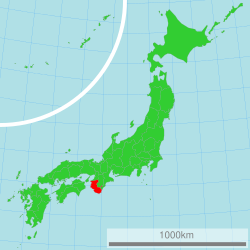Wakayama Prefecture
|
Wakayama Prefecture 和歌山県 |
|||
|---|---|---|---|
| Prefecture | |||
| Japanese transcription(s) | |||
| • Japanese | 和歌山県 | ||
| • Rōmaji | Wakayama-ken | ||
|
|||
 |
|||
| Country | Japan | ||
| Region | Kansai | ||
| Island | Honshū | ||
| Capital | Wakayama (city) | ||
| Government | |||
| • Governor | Yoshinobu Nisaka | ||
| Area | |||
| • Total | 4,725.67 km2 (1,824.59 sq mi) | ||
| Area rank | 30th | ||
| Population (April 1, 2012) | |||
| • Total | 989,983 | ||
| • Rank | 39th | ||
| • Density | 209.49/km2 (542.6/sq mi) | ||
| ISO 3166 code | JP-30 | ||
| Districts | 6 | ||
| Municipalities | 30 | ||
| Flower | Ume blossom (Prunus mume) | ||
| Tree | Ubame oak (Quercus phillyraeoides) | ||
| Bird | Japanese white-eye (Zosterops japonica) | ||
| Website | www.wakayama.lg.jp/ english/ |
||
Wakayama Prefecture (和歌山県 Wakayama-ken?) is a prefecture of Japan located on the Kii Peninsula in the Kansai region on Honshū island. The capital is the city of Wakayama.
Present-day Wakayama is mostly the western part of the province of Kii.
On July 17–18, 1953, a torrential heavy rain occurred, followed by collapse of levees, river flooding and landslides in a wide area. Many bridges and houses were destroyed. According to an officially confirmed Japanese Government report, 1,015 people died, with 5,709 injured and 7,115 houses lost.
Nine cities are located in Wakayama Prefecture:
These are the towns and villages in each district:
Wakayama supplies most of Japan with its high production of mikans (Mandarin Oranges) in October of every year.
Wakayama is ranked 39th by population in Japan with a population of 989,983. It is the least populated prefecture in the Kansai region of Japan. Its population is declining.
Mount Kōya (高野山 Kōya-san?) in the Ito District is the headquarters of the Shingon sect of Japanese Buddhism. It is home to one of the first Japanese style Buddhist temples in Japan and remains a site of pilgrimage and an increasingly popular tourist destination as people flock to see its ancient temples set amidst the towering cedar trees at the top of the mountain. The Sacred sites and pilgrimage routes in the Kii Mountain Range extend for miles throughout the prefecture and together have been recognized as Japan's 11th UNESCO World Heritage site.
...
Wikipedia


